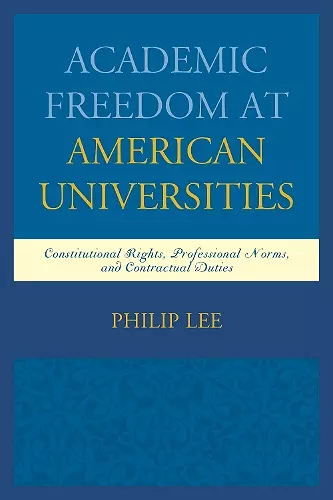Academic Freedom at American Universities
Constitutional Rights, Professional Norms, and Contractual Duties
Format:Hardback
Publisher:Lexington Books
Published:19th Nov '14
Currently unavailable, and unfortunately no date known when it will be back
This hardback is available in another edition too:
- Paperback£42.00(9781498501026)

This book details the legal and historical development of institutional and professorial academic freedoms to better understand the relationship between these concepts. While some judges and scholars have focused on the divergence of these protections, this book articulates an aligned theory that brings both the professorial and institutional theories together. It argues that while constitutionally based academic freedom does its job in protecting both public and private universities from excessive state interference, or at the very least it asks the right questions, it is inadequate because it fails to protect many individual professors in the same way. This solution entails using contract law to fill in the gaps that constitutional law leaves open in regard to protecting individual professors. Contract law is an effective alternative to constitutional law for three reasons. First, unlike constitutional law, it covers professors at both public and private universities. Second, it allows for the consideration of the custom and usage of the academic community as either express or implied contract terms in resolving disputes between universities and professors. Third, contract law enables courts to structure remedies that take into account the specific campus contexts that give rise to various disputes instead of crafting broad remedies that may ill fit certain campus environments. The proposed reconceptualization of academic freedom merges constitutional protection for institutions and contractual protection for individual professors. This combined approach would provide a more comprehensive framework than is currently available under the predominantly constitutional paradigm of academic freedom.
Philip Lee presents a convincing case for transforming higher education with respect to protecting and encouraging true academic freedom of professors. . . .Professor Lee’s research demonstrates substantial mastery of the subject matter and relevant materials. . . .Lee’s work evidences careful scholarship. . . .The author’s writing style is consistently clear and engaging – no mean feat considering the rather technical and procedural materials encompassing much of this book. Philip Lee’s Academic Freedom at American Universities presents an important argument for an alternative – contract law – foundation for professorial freedom in the academy. I recommend the book as a valuable resource for all public and private higher education institutions, particularly their faculty and executive administration. * Reflective Teaching *
Philip Lee makes a major and welcome contribution to the burgeoning literature on academic freedom through his current and cogent analysis of major court cases. He devotes special and justifiable attention to the singular role of the American Association of University Professors, which providentially observes its centennial this very year. The constitutional evolution of academic freedom which Lee traces through the past century also receives meticulous understanding in the broader context of higher education law and policy. Perhaps most notable is a concluding chapter which uniquely addresses contract (rather than constitutional) law as an alternative basis for protecting free expression on the university campus. -- Robert O'Neil, Professor and President Emeritus, University of Virginia
Philip Lee’s fascinating book covers more than a century of threats to professors for writing and speaking their minds, and it is a frightening journey, especially when one sees how many of these cases are current and old wine in new skins. Being a critical professor is not for the faint of heart, and it is sobering to see how the protection accorded faculty is shrinking. I have taught many of these cases, but his comprehensive and nuanced treatment has given me fresh eyes and renewed hope. The cases have continued, but Professor Lee is watching carefully. -- Michael A. Olivas, University of Houston
In Academic Freedom at American Universities Philip Lee skillfully details how conceptions of academic freedom in higher education have developed over time. Further, he proposes a stronger legal defense of academic freedom, based in contract law. This book is a must-read for anyone interested in legal, historical, and political issues around academic freedom in higher education. -- Natasha Kumar Warikoo, Harvard University
In Academic Freedom at American Universities, Philip Lee provides an exhaustively researched and accessible history of the development of the principle of academic freedom…. Lee’s study reminds us how important it is for individual faculty and faculty associations to remain steadfast in their commitment to including strong academic freedom language in university policies and collective agreements. * Canadian Association of University Teachers Bulletin *
ISBN: 9781498501002
Dimensions: 235mm x 162mm x 18mm
Weight: 413g
178 pages